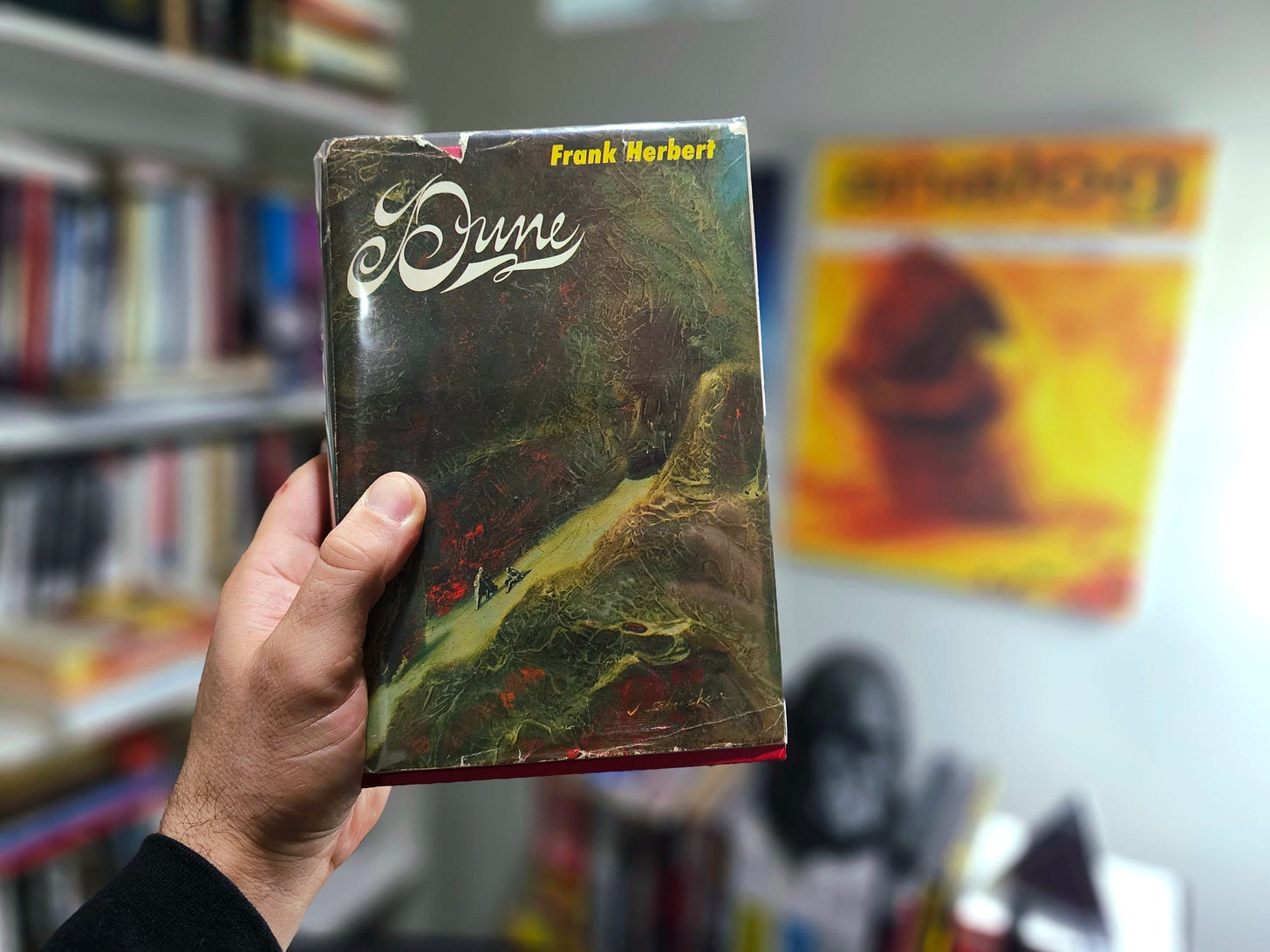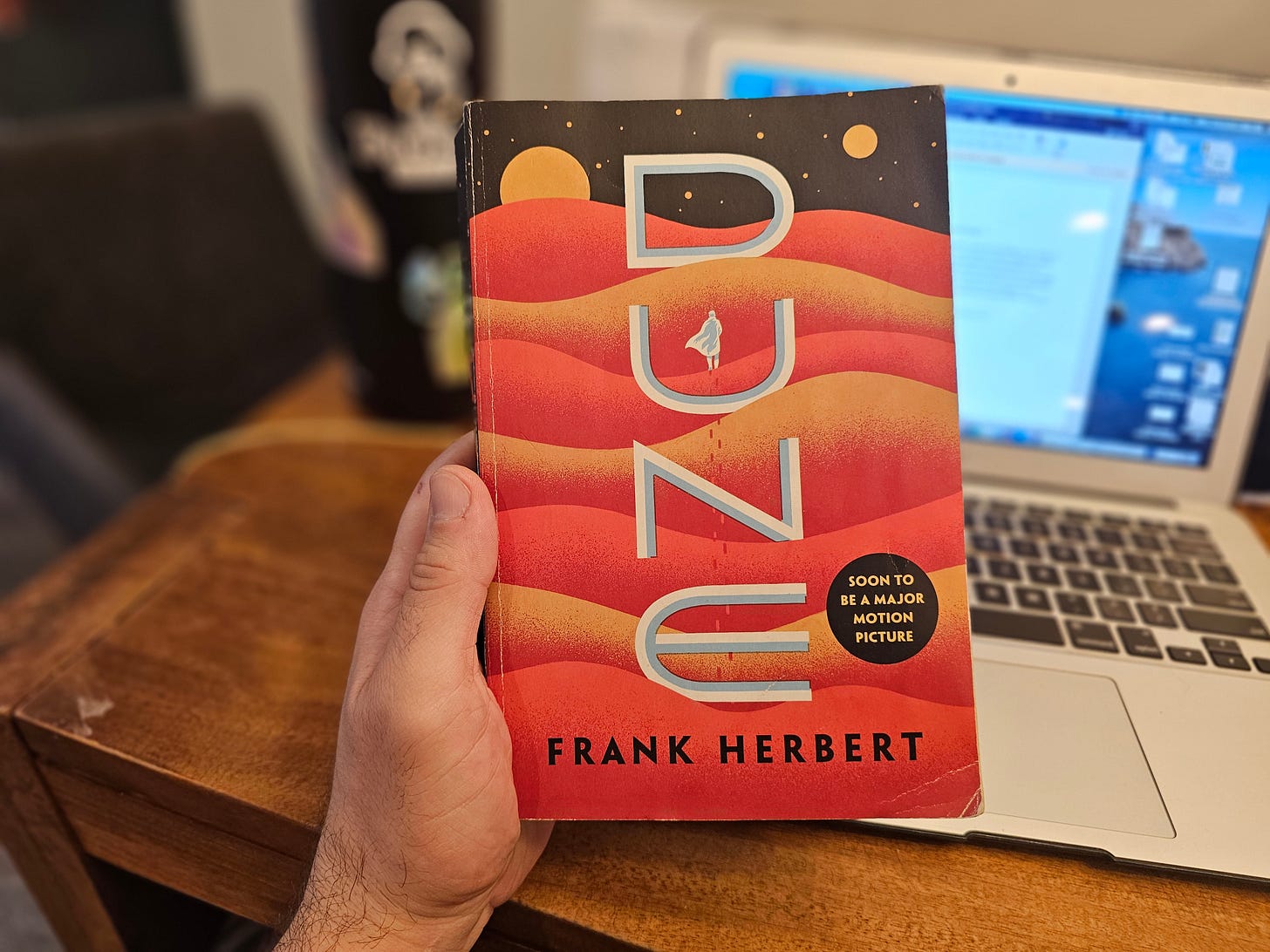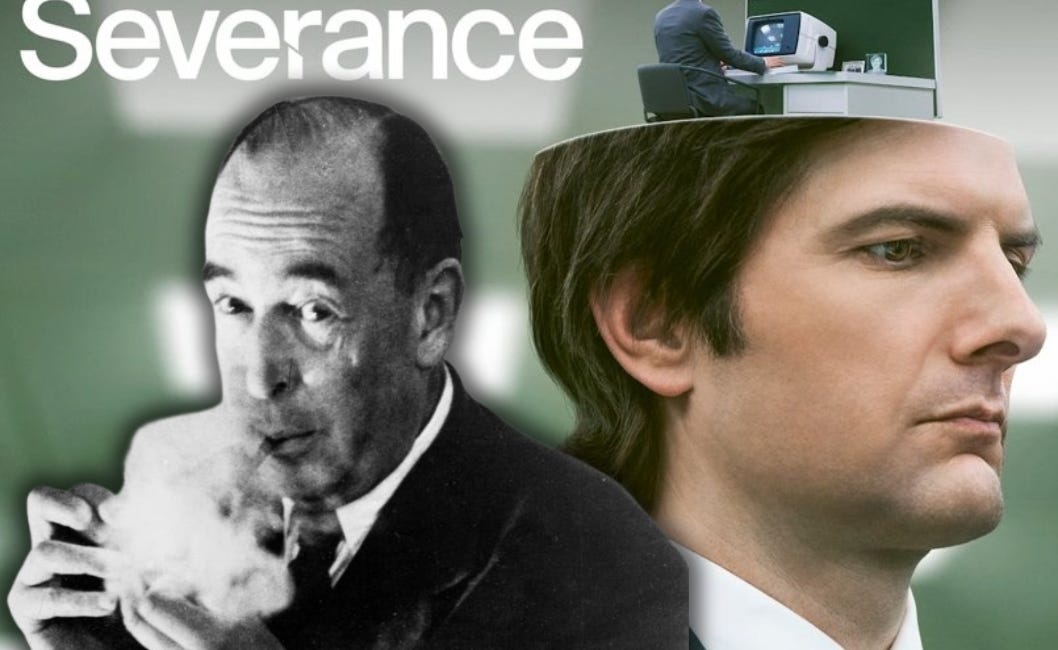
We’re reading Dune for our next Parker’s Ponderings read-along!!
*Update: Here's the running list of companion essays, I'll continue to drop them below as I finish them:
Are You Human or Animal? | Dune Read-Along Essay 1
Welcome to the Parker’s Ponderings “Dune in June” (and some of July) Read-Along. This is the first of six companion essays that I’m writing for those reading through Dune with me. Mostly, this read-along is a great excuse al…
Here's the second companion essay:
What's A Ruler without Wisdom, Justice, and Prudence? | The Philosophy of Dune
Welcome to the Parker’s Ponderings Dune in June (and some of July) Read-Along. This is the second of six companion essays I’m writing for those reading through Dune wit…
After the success of our read-along of C.S. Lewis’s Miracles, I put out my feelers to see what we should read next. I listed 7 or 8 philosophy books and SF novels that I’d feel confident writing companion essays on—essays that would help the reader understand the philosophical and theological themes in the text and help them understand philosophy and theology more generally as well. To my surprise, Dune was in almost everyone’s top three picks! Why is that surprising? I thought everyone would have already read it or would have wanted to dive deeper into a straightforward philosophy book. But Dune is probably the single best science fiction story ever written, so I shouldn’t have been that surprised and I’m very happy with this choice.
I will commit to writing at least 6 companion essays to help you get the most out of Dune, particularly the most philosophy out of it. Those essays will be free to read but our Zoom calls will be for paid subscribers, so upgrade if that sounds cool to you (they will be cool!)
Alternatively, if you just want to give a one-time gift to encourage me and say thanks, consider buying me a coffee through this button below. That would be awesome!
The Read-Along of Dune
Frank Herbert injected lots of fascinating philosophy into his novel, both in his dialogue and in his epigraphs, and in aphoristic quotations from fictional sources in the Dune-universe. It’s chalked full. But while there is a lot of philosophy to look at, Dune is not a philosophy book in the same way that C.S. Lewis’s Miracles is. So, my Dune companion essays will look a lot different than my Miracles essays. I’ll pull out the sententiae I find (the wise sayings) and explain them, comment on them, put them in contact with other sententiae. I’ll grab block quotes and explain the philosophy at play in them and help you dive deeper into the sub-field in view. And I’ll add lots of back story to the novel and Frank Herbert from the secondary sources I’ve read and will be reading during the read-along.
Now, I can’t promise this, but I’d also like to read the original serialization of Dune in the Analog magazine and tell you some of the differences between it and the final novel version. That is a want for sure but I don’t know if I’ll have time. I am writing 2 books right now and need to make a lot of progress this summer. So we’ll see. But I can promise to share pictures from my Dune collection—pictures of rare editions, unique artwork etc.—including the original artwork from the Analog serialization by John Schoenherr. If you want to see that artwork now, check out my older post
THIS Is What Dune First Looked Like
I love Dune. I love the story. I love the complexity of the mentat, Mahdi, Lisan al Gaib, Kwisatz Haderach, Emperor Paul-Muad’dib-victim-of-circumstance-Atreides. The philosophical tension between prescience and volition and the difficult ethical decisions like sullying one’s conscience vs. carrying humanity through a golden path towards flourishing. I …
As a side note, if some wealthy benefactor wants to buy a first edition copy of Dune and gift it to me out of appreciation, I would be amenable to that J.
So, we’ll start reading Dune in June and we’ll read the whole book in 6 weeks from June 5th – July 10th. I think that’s 34 days. My working copy of Dune—the one I write in—is 617 pages excluding the appendices. So that’s about 18 pages a day. That may be a lot for some of you but when you start reading, you may find yourself getting sucked in and reading much more than that at a time. I hope that’s the case. But if you can’t keep up, you can always slow down and just read my companion essays on your own schedule. They’ll stay up right here on Parker’s Ponderings.
Like before, my essays on the read-along book will be free but the Zoom book club calls are for paid subscribers. If you like my work, please do consider becoming a paid subscriber and help fund this kind of work.
Frank Herbert originally sold his story in two parts to the SF magazine, Analog: Science Fiction and Fact. Part one was called “Dune World” which took place in Analog from December 1963 - February 1964 and part two was called “The Prophet of Dune” which took place in Analog from January 1965 - May 1965. when Herbert sold the story as one book to Chilton, it was published as one book in 3 parts: Dune, Muad’Dib, and The Prophet. But there are no chapters. So this will be difficult to coordinate the reading schedule since most of us will be using books with different formats and therefore differing pages numbers.
Here’s how I’m going to solve this problem, it unless one of you readers can give me a better way to do it, I’ll give the page numbers of my working copy and then I’ll give the first line of the epigraph by Princess Irulan (epigraph just being a quotation before the start of the passage or section (usually at the start of the chapter but Frank didn’t give us chapters) which sets the tone) and the start of the first sentence in the main text of the page you should read to. Confusing? Yes. But here’s what I mean:
June 5th – pages 1-105, read until this epigraph “Over the exit of the Arrakeen landing field, crudely carved as thought with a poor instrument, there was an inscription…” and the first line of the main text: “The whole theory of warfare is calculated risk…”
June 12th – pages 106-205, stop before epigraph “There should be a science of discontent…” and the first line: Jessica awoke in the dark, feeling premonition…”
Zoom Book Club – TBD
June 19th – pages 206-305, stop before the epigraph “At the age of fifteen, he had already learned silence” and the first line: “As Paul fought the ‘thopter’s controls…”
June 26th – pages 306-407, stop before the epigraph “The concept of progress acts as a protective mechanism…” and the first line: “On his seventeenth birthday, Feyd-Rautha Harkonnen killed…”
Zoom Book Club – TBD
July 3rd 408-515, stop before the epigraph “When law and duty are one, united by religion…” and the first line: “The smuggler’s spice factory…”
July 10th – pages 516-616 (the end of the book, before appendices)
Zoom Book Club – TBD
What is Dune Actually About??
So, what’s the deal with Dune? Why does everyone love it? What is Dune really about? Well, everyone loves it because it’s an amazing story, it’s expertly written, it’s utterly unique, even if playing on Isaac Asimov’s Foundation trilogy, and it brought Space Opera science fiction to a whole new level. It really is fantastic.
What is Dune really about? Why ask this? Because everyone thinks they know what the ‘real’ message of Dune is but it’s not so obvious to me. Some will say it’s another telling of Lawrence of Arabia, or it’s a thinly veiled depiction of Afghanistan and the various empires that failed to rule it; or that it’s all about the spice, where spice is code for oil or limited resources in general; or it’s a subversion of the hero’s journey; or the subversion of the messiah figure; or it’s a warning about the dangers or religious fanaticism, or political fanaticism; or it’s about ecology and the interconnectedness of the ecosystem; or it’s a response to Asimov’s Foundation series; or it’s Hamlet in space; or it’s an exposition of process philosophy in novel form; or about naturalistic evolution revealing our latent or preternatural abilities.
Or, if we really want to understand Dune, we need to focus on the bull/matador motif, or the subversion of the dragon myth in the sandworms (spice = gold). No, no, it’s about ecology! It’s all due to a failed article about dunes of the northwestern United States. Obviously! No, no, no, no! if you were truly enlightened, you’d know that the whole story is really a product of a mushroom trip that Frank Herbert had. The water of life is really just blue magic mushroom tea, the sandworms came from a hallucination he had and really, it’s all about psychedelics. Duh.
I haven’t even exhausted the list here, but you get it. There are lots of potential interpretations on what Dune is really about and on finding the right interpretive key. In short, the reason why there are so many interpretations is because Frank Herbert wrote a mythopoeic SF novel and myth hits you where you live most. If you’re big into politics, you’re going to interpret the story along political lines—and it’s message is certainly applicable there! Same goes for religion, hero motifs, fantasy motifs, psychology, ecology, philosophy etc.
For my money, I like to think of good SF as interesting thought-experiments which comment on or even reveal more fully our human nature, similar to how Ursula K. Le Guin described it. So, I’m always looking for the ‘what-if’. Dune then is something like a ‘what-if’ Jung’s collective unconscious were true, and accessible? What-if we have latent or preternatural powers which could be realized? What would that be like and can I write a good story around that idea? The answer of course is yes, and he knocked it out of the park. But Dune is obviously not just about that particular what-if and that’s because Herbert was a mythopoeic SF author, which is kind of rare actually. For more on mythopoeic SF see my essay on C.S. Lewis’s categories of SF and my analysis of Severance as mythopoeic SF
C.S. Lewis's 6 Sub-Species of Science Fiction
C.S. Lewis is known as many things, but he’s perhaps least known by most as a science fiction aficionado and critic. But he was both. In his essay “On Science Fiction” (originally given as a talk to the Cambridge University English Club on Nov. 24th 1955), Lewis carves the species ‘Science Fiction’ (SF) into at least 6 sub-species, some of which he enjo…
Severance is Good Science Fiction According to C.S. Lewis
Severance is a show on AppleTV and it’s good science fiction. It’s really good science fiction. But why think that?
Anyways, there is lots more to say about Herbert and Dune and I’m going to be saying it in my companion essays. So, grab a copy of Dune and come join me!
Oh and if you like my work here, on YouTube, or wherever, please support it by becoming a paid subscriber. You can get exclusive content like my systematic theology lectures, apologetics lectures, exclusive essays, and more. But even more importantly, you’ll be supporting my independent scholarship and philosophical/theological science fiction and fantasy short stories.









This is so exciting! Don't think there's a better time for me to read Dune.
If I decide to become a paid member DURING the read along, and say I become a member after the first call, can I join in the calls after that?
Large worms and mining for spice. Not to mention those cool water circulation suits and the powerful hyposonic weapons